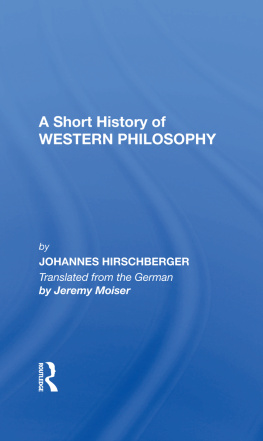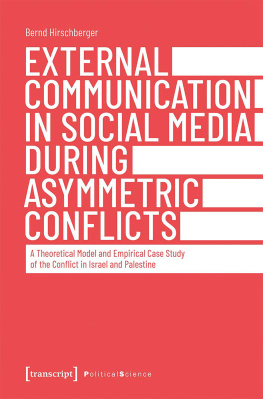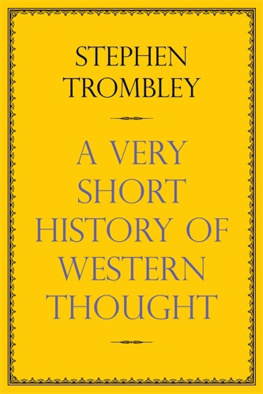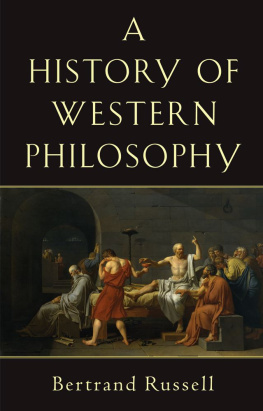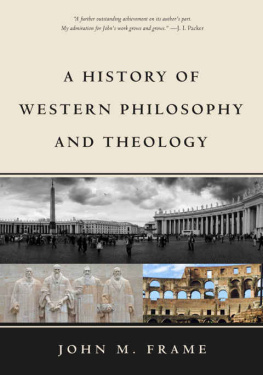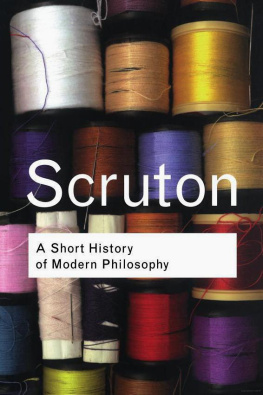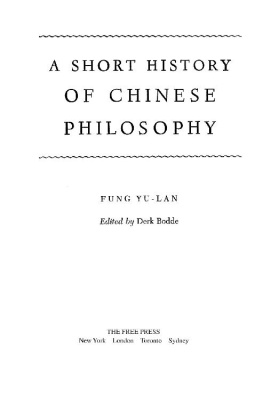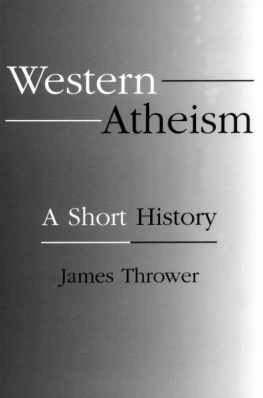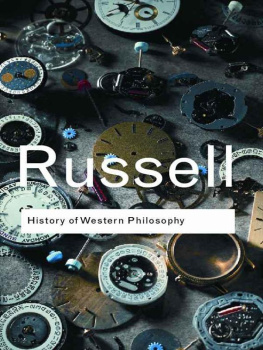a short history of WESTERN PHILOSOPHY
A Short History of Western Philosophy
by
Johannes Hirschberger
Translated from the German by Jeremy Moiser
First published 1971,1976 by Westview Press
Published 2019 by Routledge
52 Vanderbilt Avenue, New York, NY 10017
2 Park Square, Milton Park, Abingdon, Oxon OX14 4RN
Routledge is an imprint of the Taylor & Francis Group, an informa business
9TH EDITION 1971 HERDER VERLAG, FREIBURG IM B.
ENGLISH TRANSLATION 1976 LUTTERWORTH PRESS
All rights reserved. No part of this book may be reprinted or reproduced or utilised in any form or by any electronic, mechanical, or other means, now known or hereafter invented, including photocopying and recording, or in any information storage or retrieval system, without permission in writing from the publishers.
Notice:
Product or corporate names may be trademarks or registered trademarks, and are used only for identification and explanation without intent to infringe.
Library of Congress Cataloging in Publication Data
Hirschberger, Johannes.
A short history of Western philosophy.
Translation of Kleine Philosophiegeschichte.
Includes index.
1. Philosophy-History. I. Title.
B82.H5613 1976b 190 7625125
Text set in 11/13 pt Monotype Baskerville, printed by
letterpress, and bound in Great Britain at
The Pitman Press, Bath
ISBN 13: 978-0-367-28726-9 (hbk)
It is a bold man who sets out to fit into one small volume the entire history of philosophy. I feel, however, that despite inevitable shortcomings, the attempt is worthwhile in that it helps to give us a bird's-eye view. Having grasped the outline of the whole, we are in a better position to understand the parts that make it up. To put this another way, essential features and the significance of philosophy as a whole emerge much more clearly in a condensed treatment than in a detailed one. May I therefore warn the reader beforehand: if he is looking for a reference-book of individual philosophers and details of philosophical themes, this work is not for him. It offers no more than an introduction to the spirit of philosophy. The reader of German who wishes to have a more detailed account is referred to my two-volume History of Philosophy (8th German edition, Herder 1965).
JOHANNES HIRSCHBERGER
A study of the historical development of philosophy both requires and stimulates intellectual detachment. The person who limits himself to the present can easily fall a prey to passing fashions; he becomes a slave of the latest -ism. Intellectually rootless and inexperienced, he succombs to something that may exercise considerable attraction at this particular moment, but that soon withers and passes. For example, Ernst Haeckel's theories once exercised an enormous fascination on all sorts of people; they were even hailed as the definitive word in philosophy. Nowadays they are more likely to cause amusement than anything else. The same may be said of Nietzsche's philosophy, or materialism, or vitalism, or idealism.
Before we can come to a balanced judgement in our search for truth, we have to take a broad view. We need opportunities for comparison; we need to see things not just from one angle but from many; in short, we need to see the wood, not just the trees. And above all we need a deeper understanding of our own ideas, which means tracing them back to their roots. All intellectual life is the result of a growth reaching back into the distant past and there adopting the lines of development which fix our thoughts in set patterns. This is not, of course, to advocate a return to the past for the sake of it. We want to free ourselves from the past. But we also want to free ourselves from slavery to the present, and the only way we can do that is to give ourselves an idea of the relativity of much that passes for novelty. Only a thorough study of history can reveal the present as it really is.
We may usefully divide the history of philosophy into four periods: Antiquity, the Fathers and the Middle Ages, Modern Times, and the Present.
Part One
The Philosophy of Antiquity
Ancient philosophy is the spiritual heritage of the west. Ultimately it explains how modern philosophy came to be what it is. It is not out of date, it is not a matter that requires no further study. One has only to look at the works of the great philosophers to appreciate how much ancient philosophy has occupied men's minds in every century since.
Its basic divisions are: the Pre-Socratics, the Attic philosophy of Socrates, Plato and Aristotle, and the great schools of the Hellenistic period, particularly Stoicism, Epicureanism and Neo-Platonism.
The cradle of Greek philosophy was Ionia, on the coast of Asia Minor. The philosophers of the Pre-Socratic period lived at Miletus, Ephesus, Klazomenai, Kolophon, Samos. Pre-Socratic philosophy is therefore sometimes called Ionian philosophy, although strictly speaking this is not correct inasmuch as there were famous names in southern Italy and Sicily. It is also strictly speaking incorrect to call the philosophy of the Pre-Socratics simply natural philosophy (or Ionian natural philosophy), as is sometimes done, because although their reflexion started from the nature around them, what really interested them was the essence and laws of being. It was therefore a metaphysics and even a theology, because it inquired into the ultimate reasons or causes of being and becoming. But as Aristotle said, their method differed from that of Homer and Hesiod, who had also, in their own way, 'theologized', because while Homer and Hesiod still resorted to mythical images and ideas in their language and thinking, the Pre-Socratics adopted an 'inferential' or 'demonstrative' style of thought which was not content with stories but set out to understand and so prove something through its own critical observation and reflexion. This emergence of conceptual thought in the Pre-Socratics was at the same time, we may say without exaggeration, the emergence of western philosophy.
A whole series of concepts which we still use today, for example principle, element, atom, matter, spirit, substance, form, were forged by the Pre-Socratics. These thinkers created a mental currency the validity of which has lasted two thousand years. Their attempts at coining an effective philosophical language were admittedly defective and to our way of thinking somewhat rudimentary, but in my view they are not to be dismissed as cumbersome relics from the past distorting our thought and cramping our mental style. However that may be, the decisive feature of this period was not the words and ideas so much as the method of questioning. The problems the Pre-Socratics set out to answer and the approach they adopted are more important than their concepts and terminology.
The main problem which engaged their attention was the question of the arche or principle of things, Arche means origin or beginning, but for the Pre-Socratics this was taken less in a temporal than in an essential sense. The real question, in other words, was: what constitutes the inmost being of the things which look so varied and so different to our senses? Is what we see any more than an appearance, an outer skin, a surface? Is the inner core of things quite different? Does this inner core 'appear' to the senses, or is it accessible only to thought? Do the data of sense-experience yield the truth?


